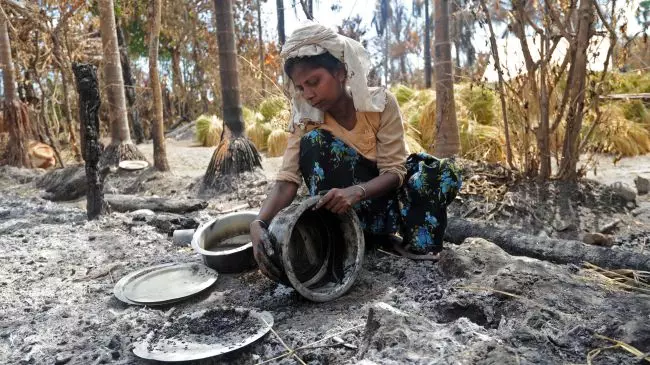Breaking News: Authority Carrying Out Mass Arbitrary Arrests in Maung Daw
Source Rohingyablogger, 29 Dec
Maung Daw, Arakan - Since 5AM this morning, the village of Khadir Bil (Nyaung Chaung), Maung Daw has been under the besiege and blockage of a joint department of Police, Hluntin (Security Forces), NaSaKa (Border Security Froces) and Military. The joint department is carrying out mass arbitrary arrests of innocent Rohingyas in the village.
"At 5AM, a joint department of Police, Hluntin (Security Forces), NaSaKa (Border Security Froces) and Military besieged the village Khadir Bil (Nyaung Chaung).They have put blockades around the village since then so that no Rohingya from the village can escape. Now the joint department is raiding every house in the village and arbitrarily arresting innocent Rohingyas. Besides, they have been harassing Rohingya women in the village. Meanwhile, some innocent Rohingyas are being released after extorting money.
U Khin Maung Shwe [sic], the Judge of the Court of Maung Daw Tsp, has been issuing arbitrary arrest warrants of Rohingyas in Maung Daw with the baseless accusations of their involvements in the violence. In the village of Baggona alone, there is an arrest warrant issued for 42 Rohingya people in addition to the previously arrested 54 innocent Rohingyas who are in the detention cells (the hells on earth) in Buthidaung. He, U Khin Maung Shwe, is a Rakhine extremist who has been, since June, in the forefront of arresting and killing of Rohingyas and exaggerating the violence against them.
He has issued an arrest warrant for 14 people in Nyaung Chaung village. Since none of them is in the village now, they have been arresting innocent Rohingyas from the village. We fear that we might the face the similar situation sooner or later" a Rohingya Elder from Maung Daw.
He added "most of the time, the authority and administration of Arakan, mainly composed of Rakhine extremists, carry out violence, arbitrary arrests and tortures against Rohingyas and Kamans without the permission and acknowledgement from NayPyiTaw (or Central Government). Sometimes, they don't even follow the direction given by NayPyiTaw."
Besides, as it has been known, the authority in Arakan is forcing Rohingyas to register themselves as Bengali, an identity they don't belong to. Registration process includes taking digital fingerprints and photographs that will permanently make their Rohingya identity disappear. Now, the NaSaKa in Nagpura (NgaKhuRa) village of Maung Daw started to force Rohingya villagers to sign themselves "Bengali."
"On 22nd December 2012, the commander Win Hlaing and Chief Staff (U-Si-Hmuu) Tun Tun Naing of NaSaKa Region (NayMayay) 5 started to force Rohingyas to sign themselves as Bengali. According to them, it is the order from higher authority Myanmar. If Rohingyas don't follow the order, they will be arrested and prosecuted. The following Rohingyas were arrested as they hesitated to accept the term "Bengali."
(1) Nazir Ahmed S/o Zakir Ahmed (30 years old)
(2) Abul Alam S/o Ataullah (27 years old)
(3) Noor Alam S/o Mohammed Shafi (46 years old)
(4) Hussien Ahmed S/o Noor Alam (19 years old)
(5) Zakir S/o Nurur Zallal (31 years old)
(6) Sayed Noor S/o Sayed (25 years old)
(7) Amnullah S/o Mohammed Ullah (31 years old)
The following two Rohingyas were forced to sign themselves as "Bengali."
(1) Shakat Ali S/o Ashu Ali 35 years old
(2) Shah Alam S/o Mohammed Alam 36 years old" reported by the correspondent of ERC (European Rohingya Council) Media.
The pogroms and all kinds of atrocities against Rohingyas and Kamans have been being carried out in Arakan for months. As a result, they are now on the verge of extinction. Yet, International government bodies and communities are not taking effective actions to stop the genocides and man-made humanitarian catastrophe in Arakan.
Non-binding UN resolutions cannot help Rohingyas: Iran MP
Source islamicinvitationturkey, 28 Dec
 An Iranian lawmaker says non-binding resolutions adopted by the UN will not help improve the situation of Rohingya Muslims in Myanmar, urging the UN to take practical measures.
An Iranian lawmaker says non-binding resolutions adopted by the UN will not help improve the situation of Rohingya Muslims in Myanmar, urging the UN to take practical measures.Mehrdad Baouj-Lahouti on Friday dismissed non-binding resolutions as ineffective in resolving the problems of Rohingyas, saying that the UN must deal with human rights violations across the globe without double-standard behaviors.
On December 24, the UN General Assembly expressed serious concern over violence between Rohingya Muslims and Buddhists in Myanmar and called upon its government to address human rights abuses.
The General Assembly also approved by consensus a non-binding resolution.
The unanimously adopted UN resolution expresses "particular concern about the situation of the Rohingya minority in Rakhine state, urges the (Myanmar) government to take action to bring about an improvement in their situation and to protect all their human rights, including their right to a nationality."
The resolution was identical to one approved last month by the General Assembly's Third Committee, which focuses on human rights.
Rohingya Muslims have faced torture, neglect and repression in Myanmar since it achieved independence in 1948. Hundreds have been killed and thousands displaced in attacks by Buddhist extremists.
Buddhist extremists frequently attack Rohingyas and set fire to their homes in several villages in the troubled region. Myanmar's government has been blamed for failing to protect the Muslim minority.
Rohingyas are said to be Muslim descendants of Persian, Turkish, Bengali, and Pathan origin, who migrated to Myanmar as early as the 8th century.


Comments